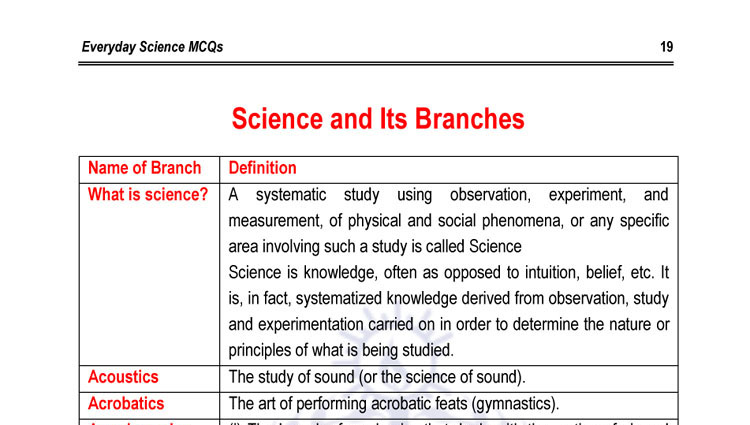Science and its Branches
PDF Link is available at the bottom of this post

PDF Link is available at the bottom of this post

A systematic study using observation, experiment, and measurement, of physical and social phenomena, or any specific area involving such a study is called Science
Science is knowledge, often as opposed to intuition, belief, etc. It is, in fact, systematized knowledge derived from observation, study and experimentation carried on in order to determine the nature or principles of what is being studied.
Acoustics
The study of sound (or the science of sound).
Acrobatics
The art of performing acrobatic feats (gymnastics).
Aerodynamics
(i) The branch of mechanics that deals with the motion of air and other gases.
(ii) The study of the motion and control of solid bodies like aircraft, missiles, etc., in air
Aeronautics
The Science or art of flight.

Before the Industrial Revolution, the amount of carbon dioxide and other greenhouse gases released into the atmosphere was in a rough balance with what could be stored on Earth.
Since the mid-1700s, humans have been emitting additional large amounts of green house gases from burning more fossil fuels to run our cars, trucks, factories, planes and power plants.
The result is that the globe has heated up by about one degree Fahrenheit over the past century — and it has heated up more intensely over the past two decades. If one degree doesn’t sound like a lot, consider the difference in global average temperatures between modern times and the last ice age was only about 9 degrees Fahrenheit.
Already, people have increased the amount of carbon dioxide, the chief global warming pollutant, in the atmosphere to 31 percent above pre-industrial levels. There is more carbon dioxide in the atmosphere now than at any time in the last 650,000 years.
Scientists expect that in the absence of effective policies to reduce greenhouse gas pollution, the global average temperature will increase another 2 degrees by 2100.